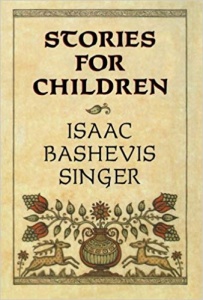I. B. Singer
Listen to the Recess! Clip
| Author | John Cech |
| Air Date | 7/14/2000 |

I. B. Singer Transcript
It’s the birthday this week of the late Isaac Bashevis Singer, the Nobel Prize winning author who, perhaps more than any other writer in this century, has kept the vivid idioms of Yiddish alive in this country through his many short stories, novels for adults, and works for children. Though he was fluent in English, Singer wrote most of his work in his mother tongue, the language he brought with him from Poland in 1935, the language of the ghettos and the shethls. Yiddish was, he said in his Nobel acceptance speech, “a language of exile, without a land, without frontiers, not supported by any government.”
Singer had gone into his own exile as a young man in his thirties after seeing the awful signs of what was to come in Europe, but in his imagination–at least in his works for children–he never left Poland. His children’s books are lovingly drawn from the rich culture and folklore of village life before the holocaust, in a timeless land which is peopled by knowing grandmothers and wise rabbis, fools of every variety (including a whole town of shlemiels), magicians and tricksters, the rich and the poor, the hard-working and the lazy, angels and devils–and wondrous animals like the kind old goat, Zlateh, who is going to be sacrificed but who, in the end, saves the little boy, Aaron, when they are both trapped in a haystack in a blizzard.
Singer stayed with folklore, and stayed with Yiddish because, he said, literature needed to have what he called, “an address” with “deep roots in a specific soil” and in its folklore and mythology. Children’s books, he felt, kept us close to these roots. “In our epoch,” he wrote, “when storytelling has become a forgotten art and…long after literature for adults will have gone to pieces, books for children will constitute the last vestige of storytelling, logic, faith in the family, in God and in real humanism….In our time, when the literature for adults is deteriorating, good books for children are the only hope, the only refuge. Many adults read and enjoy children’s books. We write not only for children but also for their parents. They, too, are serious children.”
Visit his country in books like Mazel and Schlimazel, The Fools of Chelm, or Naftali the Storyteller and His Horse, Sus and you’ll find that refuge and those roots.